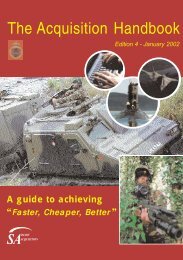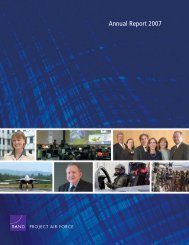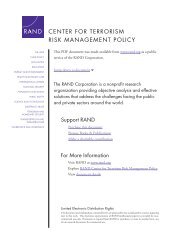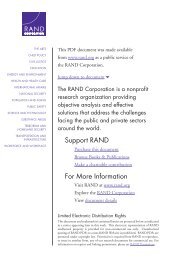How Terrorist Groups End - RAND Corporation
How Terrorist Groups End - RAND Corporation
How Terrorist Groups End - RAND Corporation
Create successful ePaper yourself
Turn your PDF publications into a flip-book with our unique Google optimized e-Paper software.
114 <strong>How</strong> <strong>Terrorist</strong> <strong>Groups</strong> <strong>End</strong>: Lessons for Countering al Qa’ida<br />
Turkey, and Egypt), and Europe (the United Kingdom). Most of these<br />
attacks were located in the area controlled by the caliphate, notably the<br />
Umayyad caliphate from 661 to 750 AD. This was part of al Qa’ida’s<br />
visionary pan-Islamic caliphate. 31<br />
Al Qa’ida also became involved in two major insurgencies against<br />
U.S. forces. The first was in Afghanistan, where it assisted the Taliban,<br />
Gulbuddin Hekmatyar’s Hezb-i-Islami, Jalaluddin Haqqani’s network,<br />
and a variety of other organizations in their struggle against Hamid<br />
Karzai’s government. The second was in Iraq.<br />
Public-opinion polls also showed notable support for al Qa’ida.<br />
In a poll released in 2007 by the University of Maryland’s Program on<br />
International Policy Attitudes, for example, 25 percent of Egyptians<br />
interviewed said that they supported al Qa’ida’s attacks on Americans<br />
and shared its attitudes toward the United States. Another 31 percent of<br />
Egyptians opposed al Qa’ida’s attacks on Americans but shared many<br />
of its attitudes toward the United States. Furthermore, 40 percent of<br />
Egyptians, 27 percent of Moroccans, 27 percent of Pakistanis, and 21<br />
percent of Indonesians had positive feelings toward Osama bin Laden.<br />
32 Support for al Qa’ida also declined in several countries. In Jordan,<br />
for instance, 55 percent of those interviewed in 2003 said that they<br />
had either a lot or some confidence in bin Laden. This jumped to 60<br />
percent in 2005 but declined to 25 percent in 2006, perhaps because<br />
of the November 2005 attacks on the Grand Hyatt hotel in Amman,<br />
which were linked to al Qa’ida. In Pakistan, 45 percent said that they<br />
had either a lot or some confidence in bin Laden. This increased to 51<br />
percent in 2005 but then dipped to 38 percent in 2006. 33 The results<br />
of these polls should be taken with great caution, since verbal support<br />
for al Qa’ida or bin Laden does not necessarily translate into action.<br />
31 See, for example, Bernard Lewis, The Crisis of Islam: Holy War and Unholy Terror, New<br />
York: Modern Library, 2003, p. xi.<br />
32 Steven Kull, Clay Ramsay, Stephen Weber, Evan Lewis, Ebrahim Mohseni, Mary Speck,<br />
Melanie Ciolek, and Melinda Brouwer, Muslim Public Opinion on US Policy, Attacks on Civilians<br />
and al Qaeda, College Park, Md.: WorldPublicOpinion.org, Program on International<br />
Policy Attitudes, University of Maryland, 2007.<br />
33 Pew Research Center, The Great Divide: <strong>How</strong> Westerners and Muslims View Each Other,<br />
Washington, D.C., 2006.

















